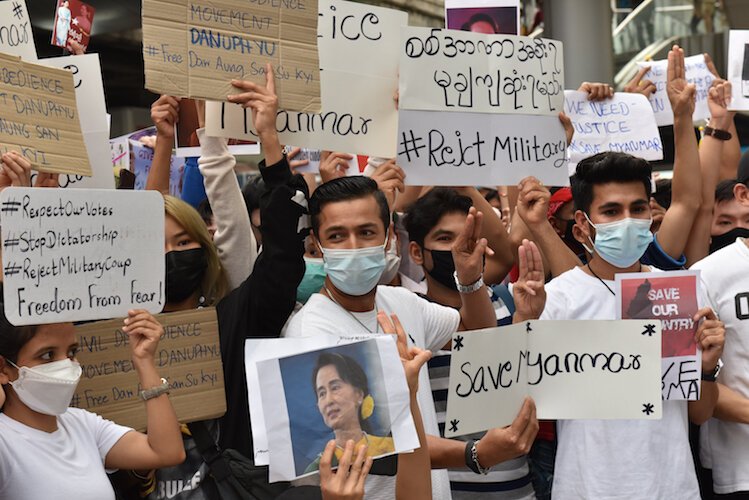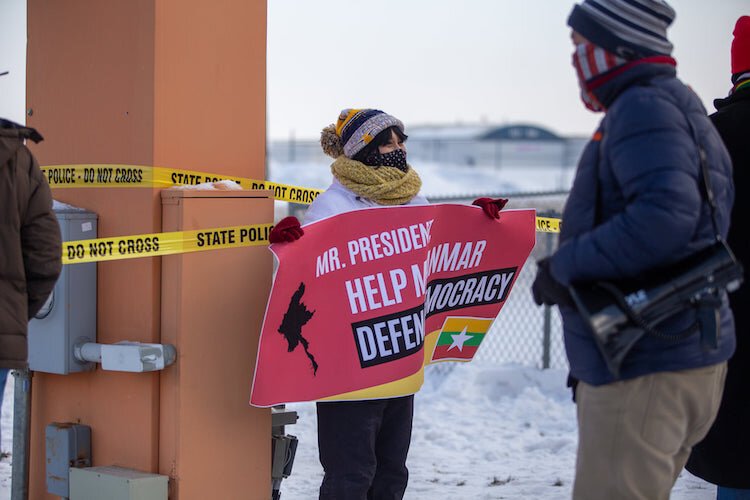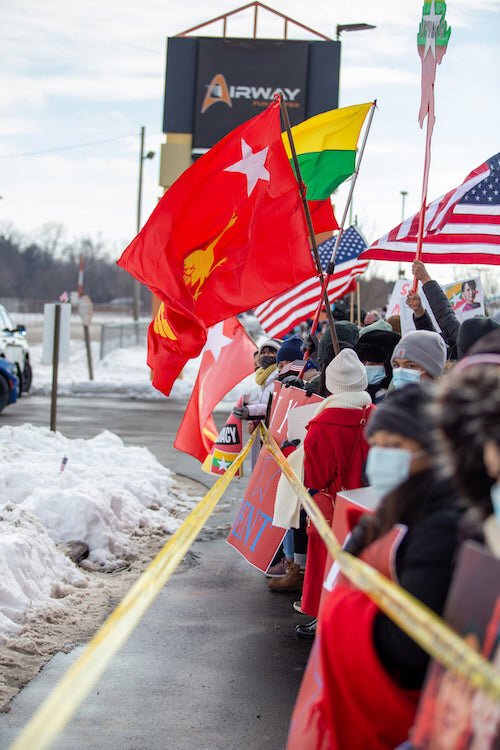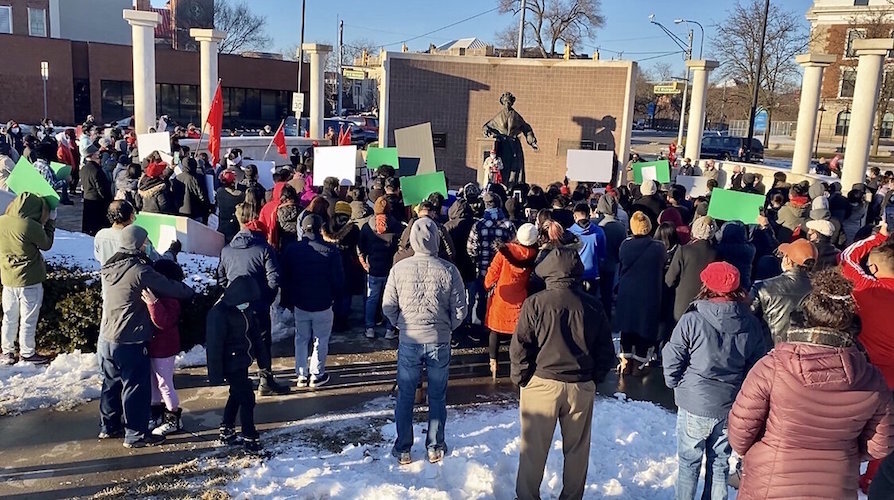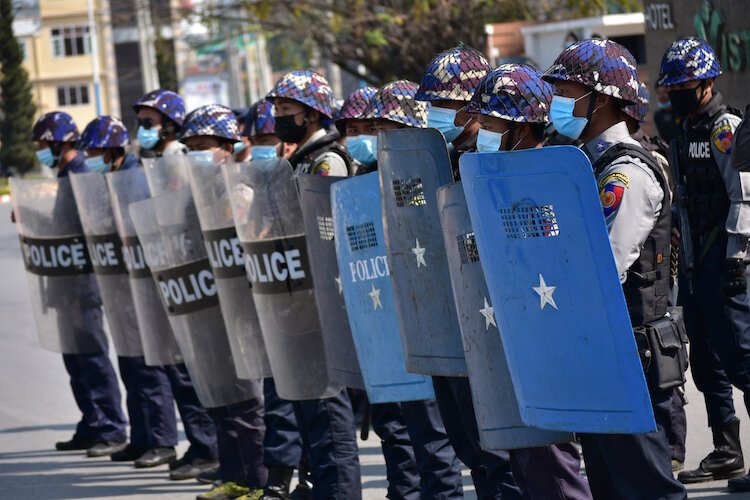In support of democracy worldwide, Battle Creek’s Burmese ask for help in protesting Myanmar’s coup
With violence escalating more than a month after a military take over in Myanmar, the Burmese in Battle Creek who once called Myanmar home are worried about relatives who are fighting for their country's democracy.
Editor’s note: This story is part of Southwest Michigan Second Wave’s On the Ground Battle Creek series.
Battle Creek’s connection to the political and civil unrest in Myanmar, the country formerly known as Burma, may not be obvious unless you are among more than 2,000 Burmese residents living in the city and Calhoun County who have family members and friends still living in Myanmar.
In the days and weeks since Feb. 1 when that country’s military ousted the government of Aung San Suu Kyi and put her under house arrest, members of the local Burmese community have held peaceful protests to draw attention to the crisis in their home country, written letters to their elected officials encouraging intervention, and raised funds to send to friends and family living through the military coup.
For some, like Htin, these efforts are being undertaken with a certain amount of anonymity out of concern for the safety of his mother, sister, and her family who live together in Myanmar. Htin asked that his full name not be used because he worries that the support he’s providing could make his family a target of the Myanmar military.
“Nobody is safe,” says Htin, who owns a business in Battle Creek that repossesses restaurant equipment which is then re-sold. “My sister and brother-in-law live in a nice neighborhood, but they live in fear. The military junta, in the day and night-time they shoot, arrest and kill the innocent people. It’s unbelievable to see what’s happening there.”
Violence in Myanmar is escalating as authorities crack down on protests against the Feb. 1 coup, reports the Associated Press on March 7. Junta violence in the past week killed about 50 demonstrators and injured scores more. More shootings were reported over the weekend.
Unlike the United States with a Second Amendment to the Constitution that gives citizens the right to bear arms, the citizens of Myanmar are prohibited from owning guns of any kind, says Dr. Than Oo, a nephrologist who lives and practices in Battle Creek. Oo, who left Myanmar 30 years ago, says members of the military are the only ones allowed to have guns.
Out of necessity, civil disobedience has become the weapon of choice for those brave enough to take a public stance, Oo says. He still refers to Myanmar as Burma, saying that at this point for him the name is just semantics.
“The country has descended into a chaotic situation. People are bravely trying to protest. There’s a lot of bloodshed. A lot of my countrymen have been injured or killed. They don’t have the weapons to fight and they can’t own firearms,” Oo says. “They are trying to stop the military machine by doing civil disobedience by refusing to go to their offices or banks. The price they pay is that a lot of business has become too difficult to operate and production and manufacturing are dwindling. This is bringing the country to a halt through economics. They have no other means to fight back against an armed rebellion.”
Oo’s wife has siblings and other family members in Myanmar. He says they have been able to keep in touch despite the military’s frequent shutdown of Internet and telephone services.
Patrick Sang-Za-Lian, who works as a language interpreter from his home in Battle Creek, says the capricious nature of these shutdowns has made it very difficult for him to maintain regular contact with his mother and brother.
“They will open the internet for a little bit and my mother and brother will send me text messages, but I can’t really contact them. My biggest worry is that they will end up being arrested because right now everybody is participating in protests,” Sang-Za-Lian says. “I think they are still doing some drumming of pots and pans every night.”
As the coup continues, arbitrary rules being put in place by the ruling military government give the armed forces the authority to beat or arrest residents and put them in jail without just cause or any evidence of wrongdoing. Sang-Za-Lian says the continuation of various acts of civil disobedience may get people, including his family members, arrested.

“For now they’re doing OK. It’s a situation that is dire because of the coup and the protesting and they don’t know when they’re going to be arrested and the police can come whenever they want to come,” Sang-Za-Lian says. “As of right now, during the days they will have to go out and protest as well. They don’t want to be silent. They want to show their discontent about the coup. Myanmar since its independence has been under military rule for more than five decades. My family knows the harshness of being under that rule.”
Myanmar’s military is not humanitarian and is showing no kindness to anyone, Htin says.
“They don’t care about anybody. When they hold that gun, they are ready to kill,” he says. “Even though you stay in your house, they can just break into your house and whip you with a baton or a gun. Everybody is unsafe right now.”
They’ve seen it before
“The same thing happened in 1988 and I was still there and I witnessed it firsthand,” Oo says. “The country was being ruled by a socialist government. The Popular uprising took place in 1988 and the socialist government was toppled, but the military cut down people and eventually took control of the country.”
Oo has been in the United States since 1989. He did his medical training in Michigan and settled in Battle Creek in 2003 because of the job opportunities. Among the friends he had in Myanmar were those who were members of the military. Those friendships, he says, are no more.
The internal conflict in Myanmar is a series of insurgencies in Myanmar that began shortly after the country, then known as Burma, gained independence from the United Kingdom in 1948. The conflict has largely been ethnic-based, with several ethnic armed groups fighting Myanmar’s armed forces, the Tatmadaw, for self-determination. Despite numerous ceasefires and the creation of autonomous self-administered zones in 2008, many groups continue to call for independence, increased autonomy, or the federalization of the country. The conflict is also the world’s longest ongoing civil war, having spanned more than seven decades.
This latest conflict began after the election in November 2020, which put the civilian-led party in power after toppling the military-backed party with 83 percent of the vote. Oo says this was a “landslide” that did not go over well with the military, which is given 25 percent of the seats in that country’s Congress under Myanmar’s Constitution. Among their concerns was having a Chief of Staff in power who would not be loyal to the military.
Oo says the military is able to do what it’s now doing because they have backing from China.
“Burma is the gateway to the Indian Ocean. (China) is covertly supporting the military coup and every time the United Nations tries to condemn this, they come out with some wishy-washy resolution,” Oo says. “The language has to change to satisfy what’s really going on.”
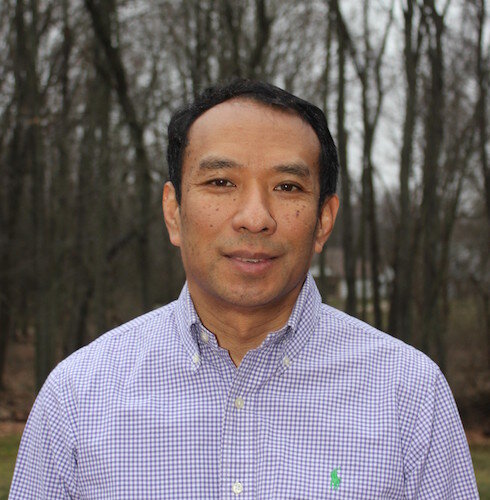
In many ways, he says it feels like déjà vu all over again and that the lives lost during the 1988 uprising were part of a wasted effort. Yet, he says those who are pushing back now shouldn’t stop.
“I feel that people shouldn’t give up and we here should support them. I know life there is tough. If we can hang on, hopefully, the military will collapse,” Oo says.
While the conflict is very real to Burmese residents locally and nationally, Oo says he doubts that non-Burmese people have a good idea of what is happening in Myanmar. He worries that because “Burma is such a small third-world country, it doesn’t have any strategic interest to the United States.”
Burmese residents here have mobilized to let their voices be heard at the highest levels of government. This included a demonstration they organized which coincided with a visit by President Joe Biden to Portage’s Pfizer facility on Feb. 19. The group held up signs and chanted as the President’s motorcade made its way from the Kalamazoo/Battle Creek International Airport to the Pfizer facility on Portage Road.
This demonstration followed one that took place in Battle Creek on Feb. 3 at the Sojourner Truth Monument attended by more than 100 people, including elected officials.
Other local efforts have included collecting monetary donations to send to Burmese residents in Myanmar who are participating in civil disobedience and are unable to work because of the current environment. But, with banks and Western Union offices closed, Htin says it’s been difficult to get the money where it needs to go.
“It’s very hard to do right now. They have no cash flow. It’s a very tight situation right now,” Htin says.
Another financial focus for Htin is the Fallen Hero House which takes in and provides support to those who have had family members killed or residents who need to hide from the military.
“I’ve had whole groups of friends who have had to hide there,” Htin says.
Sang-Za-Lian says he hopes that the U.S. government will “step up” to protect Myanmar’s civilian population, some who are as young as 17, who are being beaten and killed by the ruling military government. These are the atrocities he’s seen via video and photographs.
“The citizens in Myanmar really need international support, not just sanctions,” he says. “They work in some ways because the military has all of the resources now, but just by sanctions alone, it’s not going to work. It didn’t work for 50 years. There have to be different kinds of strategies and we need to find different ways to protect people in Myanmar, especially in minority areas of the country.”
Trying to Get Out, Trying to Come Home
One of those minority areas is the Chin State in western Myanmar which is where Sang-Za-Lian lived. Ethnic Chin has more than 90 percent of its members who are Christian, according to Persecution.org.
“They face an unspoken forced assimilation policy known as ‘Burmanization,’ which seeks to ethnically, culturally, linguistically, and religiously homogenize the ethnic minority areas of the country. It is not uncommon for them to be coerced into converting to Buddhism, the state’s majority religion,” says an article on Persecution.org.
This is why Sang-Za-Lian left, a Christian, left Myanmar — to get away from religious and political persecution. He has been living in Battle Creek for 10 years and would like to have his mother and younger brother join him, but he says that takes money, applications, paperwork, and a government that would make it possible for them to leave.
“They would love to be here,” he says. “The thing is as of right now it’s almost impossible because the military is blocking all international travel.”
The travel ban has become a major issue of concern for Htin whose 82-year-old mother has been trying to get back to Battle Creek. She has permanent resident status in the U.S. and a Green Card.
Htin has lived in Battle Creek since 1998. He came here to join his brother who was working at a sushi station at a local grocery store. Since 2014, he has been going back to Myanmar, sometimes joined by his mother, to celebrate the country’s New Year’s festivities with family and friends.
During a visit there in 2019, his mother, who lives with him in Battle Creek, decided to stay on after he left and got a re-entry permit which allowed her to remain in Myanmar for two years. Htin says he was planning to go back at the end of March to bring her home because she cannot travel by herself and doesn’t speak English.
Those plans are now “upside-down” because of the coup, which if allowed to continue will send a message internationally that these types of insurgencies can be successfully carried out and remain intact, he says.
“We need help. This is not only for Burma this is also for international democracy,” Htin says.
Sang-Za-Lian says he knows the Myanmar people would love to have international support, but they also know that they have to own this battle.
“They know they have to fight for their rights and that no one is going to be doing that for them,” he says.
The reality, Oo says, is that “If we can’t get rid of the military junta, there’s going to be another 20 or 30 years of this. I am asking people to please support the people of Myanmar who have been valiantly fighting so that democratically-elected officials and democracy can flourish and prevail.”

